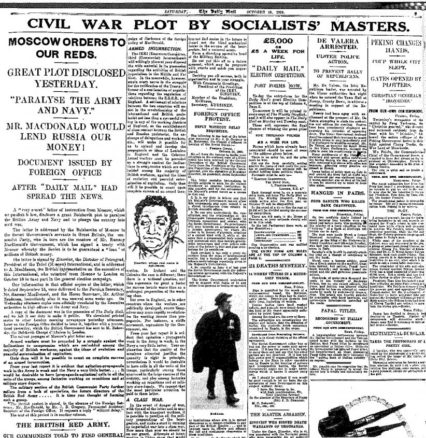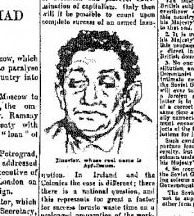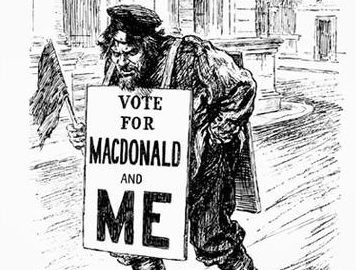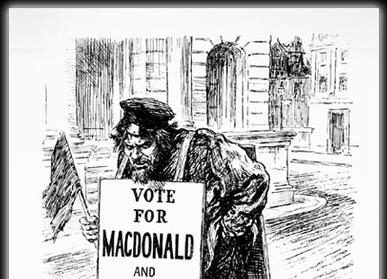Adam Somerset on fake news, The Daily Mail, the Zinoviev Letter & the First Labour Government.
“CIVIL WAR PLOT BY SOCIALISTS’ MASTERS” ran the top-of-page headline that the Daily Mail published on 25th October 1924. “MOSCOW ORDERS TO OUR REDS” continued the story in slightly smaller typeface. “GREAT PLOT DISCLOSED YESTERDAY.” “PARALYSE THE ARMY AND NAVY.”
The day of publication was a Saturday. On the following Wednesday a general election was due to be held. On October 8th the first Labour government had lost a motion of no confidence. The motion had been prompted by a particular decision of the government. It had decided to discontinue the prosecution of journalist John Ross Campbell under the Incitement to Mutiny Act 1797. Campbell had published an “An Open Letter to Fighting Forces” in which he called on the armed forces to disavow their obedience to the state “to refuse to go to war, or to refuse to shoot strikers during industrial conflicts…to go forward in a common attack upon the capitalists and smash capitalism for ever.” In this context the Daily Mail’s revelation of a directive from the Communist International in Moscow to the Communist Party of Great Britain was incendiary stuff.
“The letter is addressed by the Bolsheviks of Moscow to the Soviet Government’s servants in Great Britain, the Communist Party” the article opened “who in turn are the masters of Mr. Ramsay MacDonald’s Government”. The authorities were in full knowledge of the letter. “Our information is that official copies of the letter, which is dated September 15, were delivered to the Foreign Secretary, Mr. Ramsay MacDonald, and the Home Secretary, Mr. Arthur Henderson, immediately after it was received some weeks ago. On Wednesday afternoon copies were officially circulated by the Executive authorities to high officers of the Army and Navy.”
 The paper’s stance was that of servant for the public interest. “A copy of the document came into the possession of The Daily Mail, and we felt it our duty to make it public.” It picks out the nub. “The salient passages of Moscow’s plot letter are: “Armed warfare must be preceded by a struggle against the inclinations to compromise which are embedded among the majority of British workmen, against the ideas of evolution and peaceful extermination of capitalism. Only then will it be possible to count on complete success of an armed insurrection…it is evident that agitation propaganda work in the Army is weak and the Navy a very little better…. It would be desirable to have [propaganda-agitation] cells in all the units of the troops, among factories working on munitions and at military store depots.”
The paper’s stance was that of servant for the public interest. “A copy of the document came into the possession of The Daily Mail, and we felt it our duty to make it public.” It picks out the nub. “The salient passages of Moscow’s plot letter are: “Armed warfare must be preceded by a struggle against the inclinations to compromise which are embedded among the majority of British workmen, against the ideas of evolution and peaceful extermination of capitalism. Only then will it be possible to count on complete success of an armed insurrection…it is evident that agitation propaganda work in the Army is weak and the Navy a very little better…. It would be desirable to have [propaganda-agitation] cells in all the units of the troops, among factories working on munitions and at military store depots.”
In the detail “Zinoviev” lets the Labour leadership off the hook telling his British allies, “Keep close observation over the leaders of the Labour Party, because these may easily be found in the leading strings of the bourgeoisie. The foreign policy of the Labour Party as it is already represents an inferior copy of the policy of the Curzon Government.”
But the policy is unambiguous. “A settlement of relations between the two countries will assist in the revolutionising of the international and British proletariat not less than a successful rising in any of the working districts of England, as the establishment of close contact between the British and Russian proletariat, the exchange of delegations and workers, etc., will make it possible for us to extend and develop the propaganda of ideas of Leninism in England and the Colonies. Armed warfare must be preceded by a struggle against the inclinations to compromise which are embedded among the majority of British workmen, against the ideas of evolution and peaceful extermination of capitalism. Only then will it be possible to count upon complete success of an armed insurrection.”
 The paper’s illustration is not quite on the level used on the far side of the Rhine but makes clear the origins of Zinoviev, real name Hirsch Apfelbaum. The letter makes explicit its advice to prepare for violence. “The Military Section of the British Communist Party, so far as we are aware, further suffers from a lack of specialists, the future directors of the British Red Army. It is time you thought of forming such a group, which, together with the leaders, might be, in the event of an outbreak of active strife, the brain of the military organisation of the party. Go attentively through the lists of the military “cells,” detailing from them the more energetic and capable men, turn attention to the more talented military specialists who have for one reason or another left the Service and hold Socialist views. Attract them into the ranks of the Communist Party if they desire honestly to serve the proletariat and desire in the future to direct not the blind mechanical forces in the service of the bourgeoisie but a national army. Form a directing operative head of the Military Section.”
The paper’s illustration is not quite on the level used on the far side of the Rhine but makes clear the origins of Zinoviev, real name Hirsch Apfelbaum. The letter makes explicit its advice to prepare for violence. “The Military Section of the British Communist Party, so far as we are aware, further suffers from a lack of specialists, the future directors of the British Red Army. It is time you thought of forming such a group, which, together with the leaders, might be, in the event of an outbreak of active strife, the brain of the military organisation of the party. Go attentively through the lists of the military “cells,” detailing from them the more energetic and capable men, turn attention to the more talented military specialists who have for one reason or another left the Service and hold Socialist views. Attract them into the ranks of the Communist Party if they desire honestly to serve the proletariat and desire in the future to direct not the blind mechanical forces in the service of the bourgeoisie but a national army. Form a directing operative head of the Military Section.”
MacDonald attempted to discredit the authenticity of the letter but it was widely believed across government. He told the Cabinet that he “felt like a man sewn in a sack and thrown into the sea.” Its context was persuasive. The Cabinet had recognised the Soviet Union in February that year and an Anglo-Soviet trade agreement of 8 August was awaiting ratification. The election four days later was a Conservative landslide. 155 seats were gained to make a total of 413 Members of Parliament. Labour lost 40 seats but held 151. The devastation was the Liberal vote, a loss of 118 seats reducing them to 40.
The political impacts were several. The new Prime Minister, Stanley Baldwin, cancelled the trade treaty on 21st November. A cabinet committee was established by Baldwin to investigate the letter and concluded that it was genuine. The Conservative government did not undertake any further investigation despite allegations that the letter was forged. MI5 decided that the letter was a forgery but did not inform the government.
 The historical consensus is that Labour would have lost irrespective. Its vote held at the cost of the Liberal collapse. But it entered Labour’s bloodstream. The historian Robert Rhodes James says the letter provided Labour “with a magnificent excuse for failure and defeat. The inadequacies that had been exposed in the Government in its brief existence could be ignored.” A J P Taylor wrote that it allowed Labour to ignore the true political forces at work.
The historical consensus is that Labour would have lost irrespective. Its vote held at the cost of the Liberal collapse. But it entered Labour’s bloodstream. The historian Robert Rhodes James says the letter provided Labour “with a magnificent excuse for failure and defeat. The inadequacies that had been exposed in the Government in its brief existence could be ignored.” A J P Taylor wrote that it allowed Labour to ignore the true political forces at work.
Its influence can be seen in the reactions to the 2015 election. Labour has withheld its official report on the 30.4% vote share from public access. But an independent review by Jon Cruddas utterly rejects its conclusions that outer factors were cause of defeat. Cruddas states that working class voters overwhelmingly wanted government to live within its means. It was the policies that lost. In that sense the Zinoviev forgery has cast a long shadow.
Ramsay MacDonald was buried in Westminster Abbey 25th November 1937 surviving the non-author of the letter by fifteen months. Zinoviev, aka Apfelbaum, had been arrested in December 1934. He, along with Kamenev, agreed to plead guilty to the false charges on condition they not be executed. Stalin accepted the condition. After the conviction in the show trial Stalin ordered his execution for the same night. Zinoviev was aged fifty-two.












